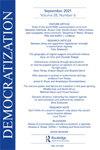冲突后的执政党政治与族群协调:科索沃的塞族名单
IF 2.9
1区 社会学
Q1 POLITICAL SCIENCE
引用次数: 0
摘要
自2013年进入科索沃政治以来,塞族名单(SL)垄断了科索沃塞族社区的政治代表权。这项研究解决了两个问题:为什么在2013年一个独特的民族社区中出现了一个占主导地位的政党,以及它是如何垄断代表权的。我认为,一个占主导地位的政党是战略性地发展起来的,以协调人们的偏好,减少社区内部的反对,允许代表们毫无争议地参与科索沃的机构。占主导地位的政党限制了民族内部的政治多元化和选民参与,从而允许在民族之间进行更自由的讨价还价。对SL的深入案例研究表明,SL的成立是为了遏制群体内对谈判解决方案的反对,并协调不同种族飞地的不同政治派别。它通过采用平行的赞助和管理结构、温和的政党和精英干部,以及以前用于强制执行种族封闭的强制机制,垄断了政治代表权。结果表明,占主导地位的政党可以弥补联合代表制的问题,但代价是集团内部竞争。本文章由计算机程序翻译,如有差异,请以英文原文为准。
Dominant party politics and ethnic coordination after conflict: the Serb List in Kosovo
ABSTRACT Since entering Kosovo politics in 2013, the Serb List (SL) monopolized political representation in the Kosovo Serb community. This study addresses dual questions of why a dominant party emerged within a distinct ethnic community in 2013, and how it monopolized representation. I argue that a dominant party was strategically developed to coordinate preferences and reduce intra-communal opposition, allowing representatives to participate uncontested in Kosovo’s institutions. The dominant party constrained political pluralism and constituent engagement in the intra-ethnic arena, allowing for freer bargaining in the inter-ethnic arena. Findings from an in-depth case study of the SL demonstrate the SL was formed to curb in-group opposition to negotiated settlements and coordinate disparate political factions in distinct ethnic enclaves. It monopolized political representation by coopting parallel structures of patronage and administration, moderate parties and elite cadres, and coercive mechanisms previously deployed to enforce ethnic closure. The outcome demonstrates that dominant parties can remedy problems of consociational representation, but at the cost of intra-group competition.
求助全文
通过发布文献求助,成功后即可免费获取论文全文。
去求助
来源期刊

Democratization
POLITICAL SCIENCE-
CiteScore
6.40
自引率
12.50%
发文量
73
期刊介绍:
Democratization aims to promote a better understanding of democratization - defined as the way democratic norms, institutions and practices evolve and are disseminated both within and across national and cultural boundaries. While the focus is on democratization viewed as a process, the journal also builds on the enduring interest in democracy itself and its analysis. The emphasis is contemporary and the approach comparative, with the publication of scholarly contributions about those areas where democratization is currently attracting considerable attention world-wide.
 求助内容:
求助内容: 应助结果提醒方式:
应助结果提醒方式:


